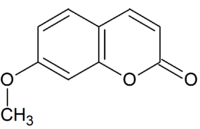Herniarin
 | |
| Names | |
|---|---|
| IUPAC name
7-Methoxychromen-2-one | |
| Other names
7-O-Methylumbelliferone 7-Methoxycoumarin Ayapanin Herniarine Methyl umbelliferyl ether | |
| Identifiers | |
| 531-59-9 | |
| 3D model (Jmol) | Interactive image |
| ChEMBL | ChEMBL49732 |
| ChemSpider | 10295 |
| ECHA InfoCard | 100.007.741 |
| PubChem | 10748 |
| |
| |
| Properties | |
| C10H8O3 | |
| Molar mass | 176.17 g·mol−1 |
| Except where otherwise noted, data are given for materials in their standard state (at 25 °C [77 °F], 100 kPa). | |
| | |
| Infobox references | |
Herniarin is a natural chemical compound. Chemically, it can be considered a methoxy derivative of coumarin or a methyl derivative of umbelliferone.
Herniarin is found in Herniaria glabra,[1] Ayapana triplinervis and in species of the genus Prunus (P. mahaleb, P. pensylvanica, and P. maximowiczii).[2]
References
- ↑ "Herniarin". liberherbarum.com.
- ↑ Santamour F. S. and Riedel L. G. H. (1994). "Distribution and inheritance of scopolin and herniarin in some Prunus species". Biochemical systematics and ecology. 22 (2): 197–201. doi:10.1016/0305-1978(94)90008-6.
This article is issued from Wikipedia - version of the 11/1/2015. The text is available under the Creative Commons Attribution/Share Alike but additional terms may apply for the media files.